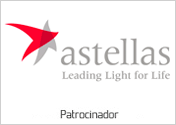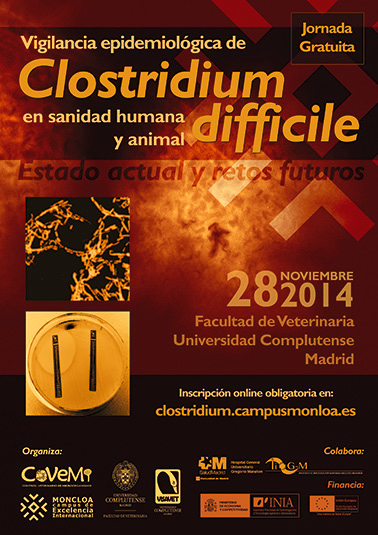
Campus Moncloa
Campus of International Excellence
Epidemiological surveillance of Clostridium difficile in human and animal health
Current Status and Future Challenges
November 28th, 2014
Assembly hall. Veterinary Medicine Faculty
Universidad Complutense de Madrid
DAY
Clostridium difficile is an ubiquitous Grampositive anaerobic bacterium which in recent years has been recognised as an emerging pathogen of humans and a diversity of animal species.
In human medicine, C. difficile is currently considered the most important agent of hospital-acquired diarrhoea, with prolonged antibiotic treatment being a major risk factor. The incidence of C. difficile associated infection (CDAI) has increased significantly during the last two decades, which has been linked to the occurrence of outbreaks of nosocomial transmission in different countries. Apart from the patient populations traditionally considered at risk for the disease (i.e., the elderly, transplanted and immunosuppressed patients), this increased incidence has also been been observed within the paediatric population and among outpatients. Furthermore, the importance of C. difficile as an agent of community-associated infection is beeing highlighted.
Recent investigations have detected a significant change in the epidemiology of CDAI, characterised by an increment not only in the incidence of the disease but also in the severity of cases. Molecular epidemiology studies have associated this changing epidemiology to the emergence of some hypervirulent and highly transmissible strains of the microorganism, such as those belonging to PCR ribotipes 027 and 078.
According to a paper published in 2013, 7,601 episodes of CDAI are estimated to occur annually in Spain (incidence of 17.1 episodes/year/10,000 hospital discharges) with an annual cost for the National Health System of over 32 million euro. This latter figure accounts for costs related to antibiotic use, prolonged hospitalization, surgical procedures, measures to control the infection, and infection recurrences.
In parallel, there is an increased concern on the role of C. difficile, and in particular of hypervirulent ribotypes, in animal pathology. In Spain, the prevalence of C. difficile in swine is approximately 75% in < 15-days old animals, with ribotype 078 accounting for >90% of isolates. The prevalence in dogs is significantly lower (approximately 30%), but hypervirulent strains (e.g. ribotypes 056 and 078) have also been recovered. A similar scenario seems to be the rule in neighbour countries, but data for some regions is still scarce. While the zoonosic nature of C. difficile remains to be demonstrated, it is evident the overlapping distribution of ribotypes (and probably even of the same strains) between humans and animals.
Another relevant aspect is the technical infrastructure currently available for studying the molecular epidemiology of C. difficile. Apart from ribotyping, other typing techniques used in C. difficile research are Pulsed-Field Gel Electrophoresis (PFGE), Multiple-Locus Variable number tandem repeat Analysis (MLVA) and Multilocus Sequence Typing (MLST). Besides, the potential use of MALDI-TOF spectrometry with epidemiological purposes should not be discounted. Hopefully, these modern technologies will improve our ability to discriminate individual C. difficile strains and cluster them according to their genetic relatedness.
Finally, the detection both in human and animal medicine of C. difficle strains displaying resistance to multiple antimicrobials is another cause of major concern, as it has a direct impact on treatment outcome and the economic burden of the disease. In particular, fluoroquinolone and metronidazole resistance seem to be emerging, so a wiser use of these drugs should be pursued.
In this workshop, we aim to give an overview of the current situation and future perspectives of C. difficile epidemiology in Spain and across Europe. The scientific programme will cover all the aforementioned aspects from a multidisciplinary perspective, with a focus in human and animal health.
Venue
Facultad de Veterinaria
Avda. Puerta de Hierro, s/n
Ciudad Universitaria
28040 Madrid
![]() Metro: L6, Ciudad Universitaria
Metro: L6, Ciudad Universitaria
![]() Bus: Lines 133 & 83
Bus: Lines 133 & 83
![]() Parking: Plaza Ramón y Cajal
Parking: Plaza Ramón y Cajal



